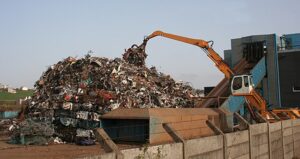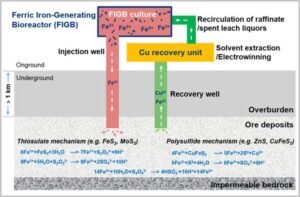Urban biomining can unlock valuable metals in post-consumer waste. This is especially important for Europe, a continent with little mineral resources of its own, therefore dependent on imports. Urban biomining will align with EU targets for critical minerals, economic revitalisation, and security.

EU’s minerals dilemma
EU critical minerals supply chains are highly vulnerable to disruption. On the one hand, new sectors like EV batteries require new resources. On the other hand, Europe doesn’t have many mineral resources of its own. And the world is growing more vulnerable all the time. But if Europe could use it’s biobased e-waste, this could open up new domestic sources. Biotechnology plays an important role in such a venture.
The elements Europe needs to build the renewable age are generally called ‘critical minerals’. Among these are elements vital to strategic interests. These include lithium, cobalt, manganese, and various rare earths. For many of these minerals, Europe will have to rely on imports. But international demand is foreseen to grow fast – which will put an extra burden on imports.
An alternative to imports
So far, the West has lagged behind geopolitical adversary China in securing supply lines of these minerals. Chinese companies already operate a large portion of the world’s critical minerals mines. Moreover, they do so at low costs, making it difficult for regions like the EU to catch up. Particularly if the European industry would comply to environmental standards. Therefore, the EU is supposed to enter into trade deals with mineral-rich regions, like South America or Africa.
On the one hand, imports will always be vital to EU’s resource security. But boosting domestic supply of strategic minerals as far as possible is still a key concern for the bloc. The alternative is to rely on external suppliers; at the risk of supply disruptions from political instability. Or having to source minerals from countries with weaker regulatory landscapes – which will damage other people. But urban biomining could offer an alternative way to source critical minerals; even in a sustainable way. Unlike ordinary mining, urban biomining doesn’t draw on virgin materials from natural deposits. It involves extracting valuable metals and minerals from post-consumer waste, re-using them.

A greener way to mine
The EU produces about 5 million tonnes of e-waste per year. This consists of used and discarded phones, laptops, computers, and printed circuit boards. They are a treasure trove of high value resources; but it is still uneconomic to take apart and recycle them, partly because of the costs of sorting. Therefore, at present most of these waste stocks will go to landfill; and there, they pose a toxic threat to ecosystems.
These stocks can be recovered by urban mining. This can be done in several ways. Today, non-biobased hydrometallurgy and pyro-metallurgy dominate. Extremely toxic and energy intensive. They require huge volumes of acidic and basic solvents. They both need very high temperatures to work, making it energy intensive and costly to operate. Moreover, these processes generate dust, toxic gases, and acid leachates that can poison waterways.
Urban biomining
On the other hand, urban biomining, which uses living organisms to selectively recover metals from waste, avoids many of these environmental problems. It requires lower temperatures to be effective, and has a smaller carbon footprint. Although it may be difficult to select the right kind of microorganism. But the scientific literature is full of bacteria and fungi that have been proven capable of leaching particular metals from waste. The EU has also been active in this field, funding projects like BIORECOVER, RAMINA, RUBICON, and BIOCriticalMetals. Now, years of research into urban biomining may be about to enter a new wave of commercialization. Otherwise, the threat of non-availability of these minerals in the near future looms large.
European firms driving urban biomining
Several European firms are active in this field. Like Brain Biotech, a leading German biomanufacturing company. This recently announced it was working with PX Group to develop a proof of concept for recovering gold from e-waste with biological means. Their device uses bioleaching, using living microbes to extract metals. Specifically, it relies on the chemical compounds excreted by these microbes as they metabolise the metals, making them easier to recover.
Moreover, Europe has a couple of other companies that offer biobased urban mining tools. BiotaTec based in Estonia offers biomining tech on industrial waste that will make critical raw materials more available. In the UK, N2s offers services in recovering metals from e-waste, using bioleaching. Further away, New Zealand’s Mint Innovation focuses on recovering precious metals like gold and critical minerals. And then, some companies make use of fungi as a potential tool for metal recovery. But unfortunately, these fungi grow slowly; and their growth media prove to be expensive.
Sustainability of urban mining
Urban mining is still in its early stages, and biobased methods are still an emerging technology. Yet there is a growing need for the development of this low-impact mining technology. Early 2025, there was a security conference in Munich, where EU and world leaders discussed international security challenges. Critical minerals were top of the agenda. Many representatives stressed the need for recycling as a crucial way for resource-poor Europe to secure them. European Commissioner for Environment Jessika Roswell urged the EU to close the mineral loop and keep valuable materials in circulation. She promised the Munich conference that she would prioritise a competitive circular economy for critical minerals.
This will expand the range of critical raw material supplies that the EU sources from. It aims to prevent import dependencies, especially from geopolitical rivals like China and Russia. Among the methods available, biobased methods offer the most environmentally sound way of scaling the European urban biomining industry. This is in line with the existing European policy to become more independent of foreign suppliers of raw materials. Biotech for urban mining is one of the few ways in which the EU can boost its domestic production of critical minerals in an environmentally sustainable way.
The new era
This policy will also serve a relatively new priority: building out its own regional defence capacity. A pressing need, as Europe can no longer rely on American guarantees. Therefore, Germany and France now call for EU cooperation in increasing its own defence production. And as many critical minerals have both renewable and defence applications, the push to build Europe’s military capacity will no doubt give a boost to urban mining projects. Even though industry still needs a clear backing from the EU to make the leap from small-scale production. Companies will need a consistent policy, in the form of targets backed by financial incentives. Essential for pursuing the production of recycled and low-carbon critical minerals.
Interesting? Then also read:
Bioeconomy needs circularity
Biomedicines are coming
Bio concrete and other construction materials from local resources
